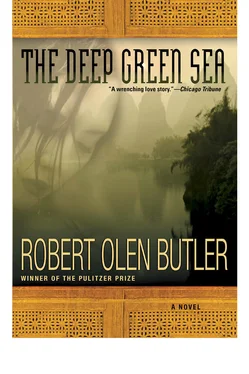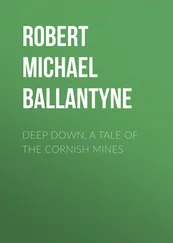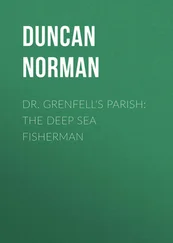Mr. Thu lives in a place where I have taken many foreign officials and businessmen, a New Economic District where the rapid development of the Socialist Republic of Vietnam is very clear. There are many streets, soon to be full of children and trees, where blocks of beautiful apartments, constructed from highest grade portland cement made in modern factories in Can Tho, glisten white in the sunlight. We drive down such a street and stop. Before Mr. Thu gets out, he and I speak a little in Vietnamese — he thanks me for this time off, because he has a sick child and his wife’s two brothers and their families are visiting from Hanoi, and I thank him for letting me take the car — and while I am speaking my own native language, I am feeling very strange. I am thinking very much how Ben cannot understand what I say or what I hear. And I am hearing even the English in my head as a foreign thing, words about cement production and economic development. And I know I cannot touch Ben when Mr. Thu is gone, though that is what my body yearns to do. This strange feeling makes itself clear to me: I feel suddenly like a person who does not know who she is.
Then Mr. Thu is out of the car and walking away and I watch him until he has disappeared into one of these modern socialist-state apartments. I sit for a moment even after he has gone and I do not say anything and I do not look into the backseat. Ben is silent, too. I am the ghost now. I think what it must be like for my father, watching someone he loves without a language to speak with or a body to touch with.
Then Ben speaks my name. “Tien.”
I turn. He slides forward in the seat. Our faces are very near. I wait but this is as close as we are going to get. So I ask him, “Are you ready?”
“Yes.”
“Do you think you can drive on Vietnam’s roads?”
“You forget what I used to do here.”
“My truck driver.”
“I know the rules. Never stop. Small gives way to large.”
“You are ready to be as dangerous as my countrymen.”
He smiles at this thing I say. I am glad. He gets out of the car and goes around and he slides in behind the wheel, beside me.

I clutch the steering wheel and it’s a stunningly familiar thing. To drive and not to feel.
“What have you done these three days?” This is Tien’s voice and I turn to her, trying to hear what it is that she’s said.
Finally I answer, “I’ve watched a paddle fan spin on the ceiling.”
“I have no fan to watch. I have only tourists and prayers to a man I think maybe does not hear me anymore.”
My hands are cranking the engine. I want to drive now.
Even though it’s not a truck and an interstate. It’s a Fiat sedan with a Saigontourist sticker across the back windshield and an alien street rimmed by an ugly block of apartments. And another street, running through a cleared field waiting for more concrete, and another, packed full with motorbikes squeezing past ramshackle produce stands and restaurants and warrens of scrap wood and corrugated-sheet-metal houses. She tells me where to turn, but says no more than that. I’m glad. I want to hold a wheel and drive in the silence that was my life for years. Even going slow. Even with young men with black flares of hair and young women in sunglasses looking in on all sides while I creep ahead only to find myself in another press of new eyes. It’s all right. I’m holding the wheel, I’m moving, I turn off the air-conditioning and roll the window down and let in the smell of exhaust, a smell of the road, and I have a place to drive to, a place ahead that will resolve all this.
And finally the city traffic loosens somewhat and the road widens a little and though it’s full of potholes and oxcarts and trucks pushing in front of me or jumping out of the oncoming lane and forcing me over, still I can push a bit and I lay on my horn and the women on bikes and the tiny three-wheel Lambretta buses and all the motorbikes give way for me. I just stay clear of the trucks and they’re funky-ass things, for the most part, old deuce-and-a-halfs or old commercial De Sotos and Jimmys, with jerry-built water tanks on the tops of their cabs and copper tubing feeding down into the engines, doing the work of long-gone radiators that can’t be replaced.
And then we’re farther out of town, heading for where Long Binh must’ve been, a massive Army base camp out northeast of Saigon, the place we all passed through on the way into the war. And there are billboards: an enormous display of a piece of PVC pipe, a giant tube of some Hong Kong toothpaste, and a billboard that pleads, GOLF VIETNAM. And then there’s a turnoff to the place where a sign says they’re building the Vietnam International Golf Club. I try to figure how far we’ve come, to see if they’re building that right there on the doorstep we used for all the guys to come and fight in Vietnam. But I don’t think the government that has filled Tien with all those little riffs of ideology would have the sense of humor for that.
I think of her. I look. She has her face turned to the rush of countryside. A flooded rice paddy now. Women out there in conical straw hats bent into their work, up to their ankles among the low green plants. And a boy near the road on the back of a water buffalo. I look to the highway and I swerve around a pothole as big as the buffalo’s head.
But being on the road is good. The road rolls, even if you’ve got to dodge and honk and give way. Your life passes. You get through the hours you wouldn’t know how to get through if you were sitting still somewhere. And I must have missed whatever was left of Long Binh because we’re going through a town called Honai and there was nothing like that between Saigon and the camp. We’re crawling again, but still moving. Four Catholic churches almost one after the other. And no pictures of Ho out here. It’s a country I don’t expect.
Then the road again and rubber trees, a plantation, the quick run of the even, deep rows of trees, their white trunks all with the same dark slashes, and a grave out there, a little stone monument in the trees. I follow it with my eyes and I see Tien again and she’s looking, too, turning to see the tomb. I think to speak to her. At least to explain my silence, though surely it’s best for her, as well. It’s a kind of touching, our talk. This trip is hard on her and I’m very sorry for that. But the rubber trees vanish and now there’s a pond, and I turn to the road and it is narrowing down, and something is fitting together in my head and Tien slides away from me once more. The pond — I look again before it’s gone — the pond curves away from the highway and out to the north and it’s shaped like a sickle blade and the sun flares there and is gone and the pond is gone and I know the place. Ahead, the road has narrowed but tree lines have taken up, maybe a hundred yards back, on both sides.
And suddenly this feels like the place. I have never remembered these things — the rubber trees, the curving blade of a pond, the narrowing of Highway One — even in my dreams of that day. But now it’s clear. I slow down, I draw off the road, the shoulder is narrow, but I squeeze far over, the wheel bucking a little in the uneven ground, and I stop.
“What is it?” Tien says.
I get out of the car. A truck flashes past, ragged and Army green, and its horn blares and Dopplers away down the road. I look and it’s full of hay but it’s still a deuce-and-a-half, a truck from some old convoy, and I know where I am, I feel sure I know, and a cluster of motorbikes races by, a voice floating out, shouting, meaningless words. I start across the road. Hurrying before another truck coming from the north. And I’m off the road and the truck’s draft buffets me and I wade into the scrub growth and I stop and he could have stood right here.
Читать дальше













